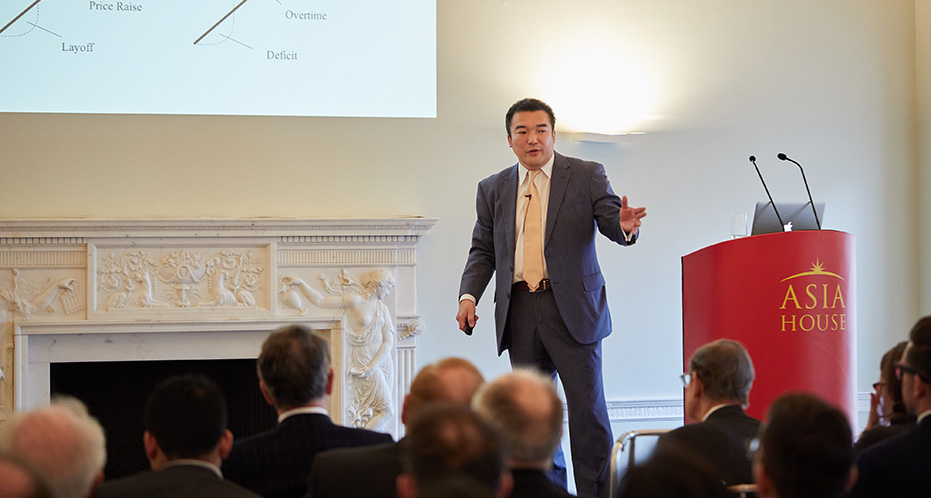Driving commercial and political engagement between Asia, the Middle East and Europe
Driving commercial and political engagement between Asia, the Middle East and Europe
Driving commercial and political engagement between Asia, the Middle East and Europe

Japanese Prime Minister Shinzo Abe’s focus on corporate governance has proven the most successful of his economic reforms – but there’s much further to go in transforming leadership culture, a top economist told business leaders and government representatives at Asia House.
Professor Seijiro Takeshita, Dean of the School of Management at the University of Shizuoka argued that transforming organisational leadership as part of the ‘third arrow’ of Abenomics is being hindered by a lack of incentive for change and enduring cultural factors.
“If we were keeping a scorecard on Abenomics, corporate governance reform would get a grade A,” Professor Takeshita said, citing new governance and stewardship codes and the speed at which they have been introduced.
“It is seen as the clearest success in the ‘third arrow’ of Prime Minister Abe’s reforms.”
However, progress is being hindered by “leadership creating organisational silence,” Prof Takeshita suggested, drawing on recent high-profile scandals involving Japanese companies.
The inter-generational nature of leadership roles in Japanese companies means “negative legacies are passed on for decades,” Prof Takeshita said, while a managerial belief of “I know best” fosters a lack of upward communication. This stifles critical thinking and can entrench deep-seated organisational problems.
Drawing interesting comparisons with western models of governance, Prof Takeshita highlighted a notable difference in executive pay which may be a contributing factor. Whereas salaries in the US tend to have a steady increase throughout workers’ careers, in Japan executives are paid less, only to enjoy a significant increase at the end of their careers.
“When you finally get the rewards of being underpaid at the end of your career, are you going to pressure for change?” Prof Takeshita asked. “There is no incentive to change the system.”
During a wide-ranging and insightful lecture, held in partnership with the Embassy of Japan, Professor Takeshita also highlighted how the Japanese approach to innovation differs from western models.
“The US model is about profit maximisation and rewarding shareholders, but in Japan it is about long-term growth,” Prof Takeshita explained. This means CEOs in Japan are less likely to make lay-offs during fallow periods, which creates employee trust.
The Japanese focus on steady growth, meanwhile, means its governance model performs better over longer periods, compared to the US model which is tied more closely to rises and falls in innovation. This has fostered Japan’s success in process innovation, Prof Takeshita suggested.
The country also has much going in its favour, including a well-educated and disciplined population, making Prof Takeshita optimistic about Japan’s economic future. But he concluded that corporate governance is where the real opportunities for positive change lie.
“We need to see changes in this area but I think the pace of transition will be slow,” he said.
